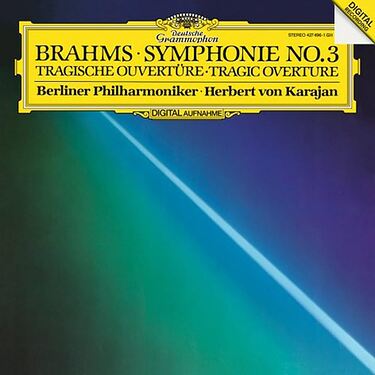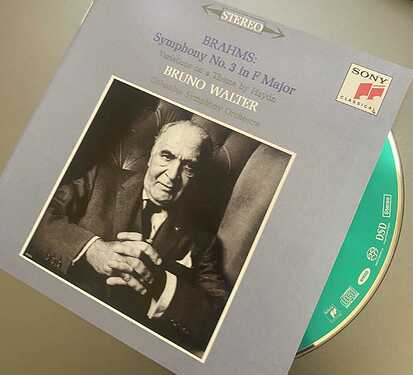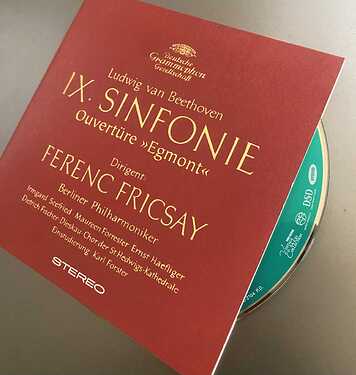Enjoying this at work currently…
Apple Music>Aune Yuki>7hz Timeless
Brahms symphony No.3
Movement 3 is beautiful, easy listening if you have not heard it yet. So mysterious and elegant.
@Barolo Indeed! And Welcome!
I’ve never heard the Vivaldi cello concerto(s) so I’ll give that a try.
Most of the Vivaldi works that I like are violin-based, and almost all of them are by Rachel Podger, who I’m a big fan of.
That is a good one but I actually came across this a while ago and prefer it, same cellist but different concerto’s. I find it to have an excellent balanced presentation and clarity. Vivaldi can get muddled very easily.
Thanks for this recommendation, I finally caught up with some of my listening backlog.
Thought I’d move this to the classical music thread.
I’ve always liked the John Eliot Gardiner version but traditionalists like Hurwitz hate Gardiner. His choice is the second (1962) recording by Munch/Boston, not the earlier one from the 1950s. It is a good big band high intensity performance. I also like Paray/Detroit on Mercury. Haven’t tried Ozawa yet.
Was scouring the net for modern recording recommendations and Francois-Xavier Roth came up a lot and after only one listen just now, I really like this one.
@PaisleyUnderground Also ck Dudamel/LA. It’s a live recording. ![]()
I do have that on CD already. it is quite nice. It’s just a piece I havent gotten to yet in terms of finding my own “reference”. I have too much to listen to and not enough time or I end up listening to Sibelius again.
This is how I decided, using my own made up rules LOL.
When I’ve been comparing, I normally start with the second movement (A Ball) and fourth (March To The Scaffold), which both need to have some rhythm to meet preferences, so if the conductor can’t get those right for me, then I don’t bother with the other movements. If it passes that test, then I’ll listen to the whole thing.
I also like be close to the stage, not in the back, and I want the sound to be full and rich.
This appears to knock out some of the European favorites (Colin Davis/Concertgebouw, Martinon, Markevitz, and I’m sorry to say Gardiner, whose acoustics really let him down). A lot of people love them but they don’t float my boat. Listing them because if you don’t have the same preferences as me, you might like those recordings.
I also get irritated by extreme swings in dynamics, where it’s extremely soft, followed by an extremely loud climax. Gardiner is guilty of this (honestly, I really used to like this performance until I did the comparisons) as is a Hurwitz modern recording favorite, Janowski/Pittsburgh, which sounds spectacular but I had to keep messing with the volume and couldn’t relax and listen to the music.
This surprisingly leaves me with US orchestras from the 50s and 60s, all of which sound great in their latest remastering. It’s funny how remastering of pop & rock went downhill, but it’s just gotten better and better with classical music IMO.
- Paray/Detroit is fast and frantic, and I’d suggest you try it to see if you like that style of Berlioz.
- Hurwitz likes Munch/Boston from 1962 but I prefer the 1954 performance that is more readily available as the “RCA Living Stereo” release. It sounds better IMO and I like the performance more, but I might be in the minority. Best way to compare them is if you stream the “Charles Munch Conducts Berlioz” box, which contains both performances. It’s a good contrast to the Paray recording.
- Bernstein released 2 performances with the NYPO in the 60’s (1963 and 1968). Hurwitz prefers the first one from 1963, I like them both, but have a slight preference for 1968. Sony mislabeled the date on many of the Bernstein rereleases, so the only way to tell which is which is by looking at the timings, particularly the first and third movements.
1963 1968
1. 13:18 12:31
2. 6:15 6:07
3. 17:14 15:03
4. 4:49 4:28
5. 9:56 9:32
For modern performances, I did like that Dudamel version that @TempoTim recommended, but the Francois-Xavier Roth is still the one for me. I like the precise, nimble and clear playing of Roth’s smaller orchestra.
Just trying to explain the method to my madness, not expecting anyone to like the same performances.
@PaisleyUnderground Thanks for the extensive search and evaluations!!
And I thought “I” was the fussy one. PS I prefer the term “discerning” lol.
LOL, I have decades of catching up to do, so I need to be fussy.
Back in the 90’s, I’d get my Penguin Guide To Classical Music, pick whatever got a 3 stars rating (and hopefully a rosette) and buy that from my local CD store. And I’d be happy, knowing it was the “best”.
In the 00’s, I found out that my library was in a network and that I could order anything that any library had. And that’s when I discovered that “best” was subjective, and that there were performances I liked that didn’t get that damn rosette.
And now streaming gives me access to almost everything ever available (with my library network as a safety net for anything not streaming), and my compulsion to find out the “best” for me has kicked in and become my latest hobby.
I follow the same process, especially for longer works. Find a part that has importance to me and start comparing from there. Perhaps it might lead to missing out on a few nice pieces but I doubt it - especially if its an issue with acoustics/tonality that will be present across the entirety of the performance. Once I find a few that pass the initial test I listen further and generally to the whole of it for nuance between recordings.
I imagine a lot of people do simliar if they are comparative listening within this genre.
Agreed, I do wonder if this is magnified by certain setups but generally if Im familiar with a recording and I find myself bracing for an upward dynamic swing things have swerved to the stupid side of macrodynamics and my frequency of listening to said recording will be low.
I do think we’d probably generally agree on preferred performances. I want to relisten to the Roth version as a baseline again and then at least get to Paray/Detroit soon. I will also try to sample those European recordings just to get a sense of them.
What I do is set my gain during tutti/loud parts to where it is at my limit, then turn it down slightly.
If I can’t hear the soft parts, then I take that to be a problem with the setup.
I used to prefer Karajan but I think Walter adds an extra dimension to this great piece by Brahms.
Old but sounds great. Recorded in 1960.
A highly regarded 1950s performance.
You gotta have a Ninth.
The Adagio and Finale are very well done.
The recording appropriately captures both intimacy and grandness.
Not new to me, but spent time with this Mahler cycle tonight. No details
get lost in these recordings. Excellent, imo. The initial horns entrance is gorgeous!
Available most services. Enjoy.
I agree, Gielen’s Mahler cycle is fantastic. And I just discovered his Beethoven cycle last week, and have been enjoying that over the last few days.





